Taiwanese badminton duo Lee Yang (李洋) and Wang Chi-lin (王齊麟) yesterday won the gold medal in the men's doubles final at the Paris Olympics, defeating China's Liang Weikeng (梁偉鏗) and Wang Chan (王昶).
The victory made them the first Taiwanese shuttlers to win more than one Olympic medal with back-to-back gold. They were crowned champions in the event at the Tokyo Olympics three years ago.
Earlier in the day, Taiwanese boxer Lin Yu-ting (林郁婷) secured her first Olympic medal in front of a crowd chanting her name, a day after fellow boxer Imane Khelif did the same, following days of online abuse and intense scrutiny over their eligibility to compete in the Paris Games.
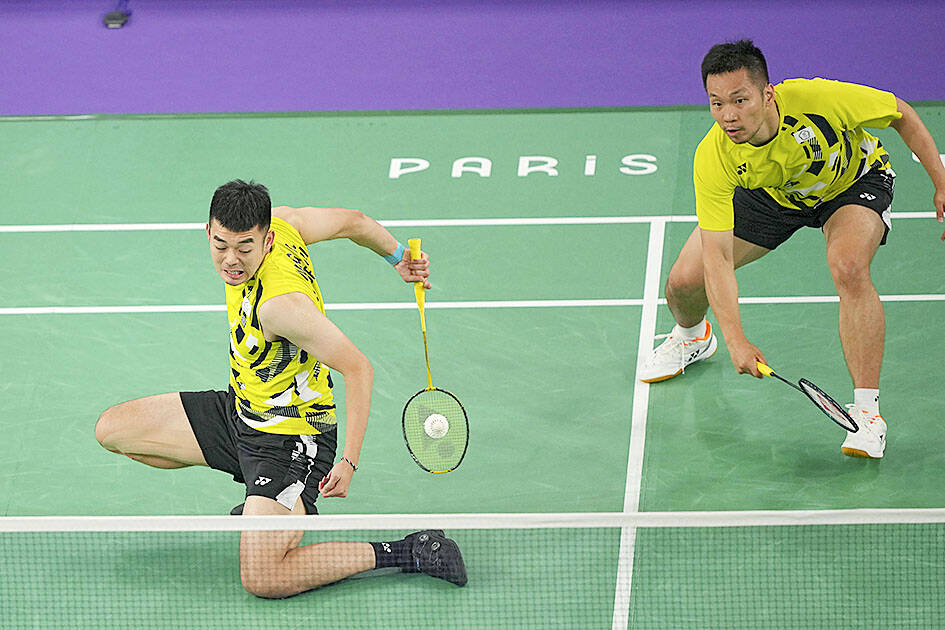
Photo: AP
Lin defeated Svetlana Kamenova Staneva of Bulgaria in a women’s 57kg quarter-final, on a unanimous points decision. In Olympic boxing, there is no bronze-medal match and the two losing semi-finalists both win bronze.
The Taiwanese said she appreciated the support from people back home, where she has the backing of the public.
“I just know that everyone is cheering for me and I know that all the people in Taiwan are behind me and support me,” she said.
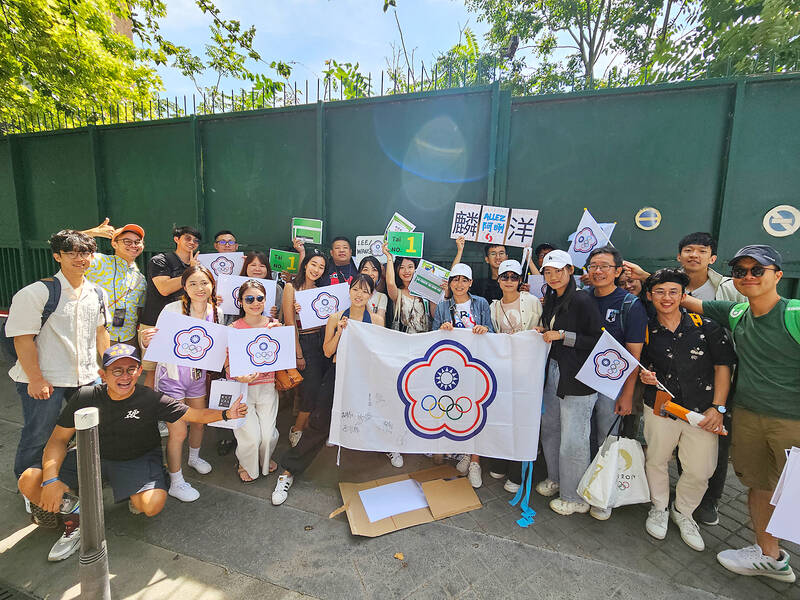
Photo: Chen Chih-chu, Taipei Times
Lin beat Sitora Turdibekova of Uzbekistan 5-0 in her opening fight, and is next to face Turkey’s Esra Yildiz Kahraman on Wednesday.
Lin and Khelif have been at the center of a dispute about gender and regulations in sports. Critics have brought up their disqualification from last year’s world championships after the International Boxing Association (IBA), claimed they failed unspecified eligibility tests.
The IBA has been banned from Olympic participation, following years of criticism from the International Olympic Committee, including concerns about governance, financial and ethical issues.
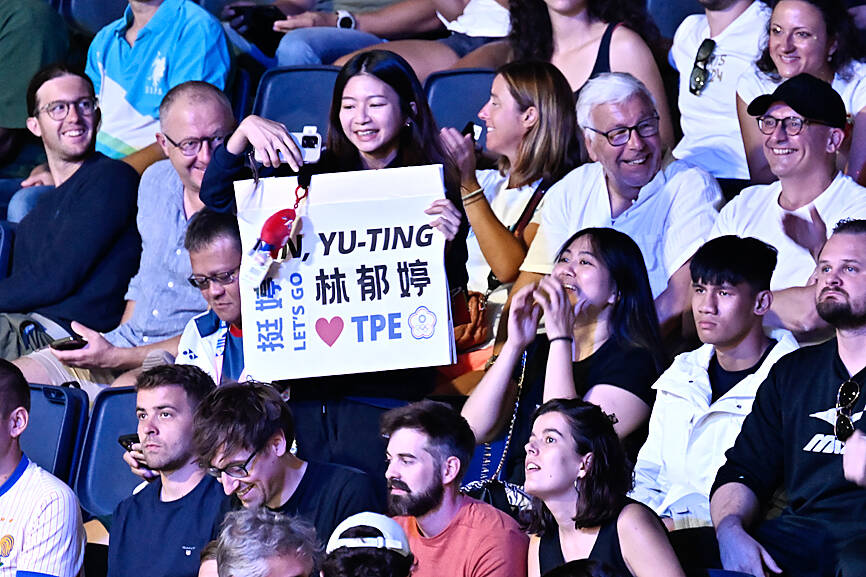
Photo: Chen Chih-chu, Taipei Times
Taiwanese athletes also performed well in boxing and shooting on Saturday.
Boxer Chen Nien-chin (陳念琴) is to take home at least a bronze — the first Olympic medal of her career — after beating Uzbekistan’s Navbakhor Khamidova in the 66kg quarter-finals.
“What I want is gold,” said Chen, after defeating her opponent 5-0 on points and advancing to the semi-finals.
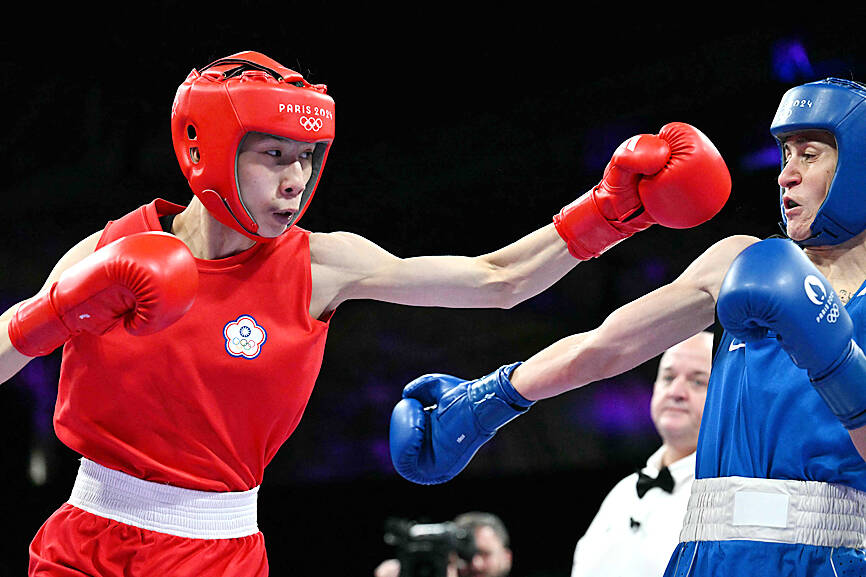
Photo: AFP
Paris marks Chen’s third Olympic appearance, after she participated in Rio and Tokyo.
Meanwhile, Wu Shih-yi (吳詩儀) lost to top-seeded Yang Wenlu (楊文璐) of China 5-0 on points in their women’s 60kg semi-final bout, but takes home a bronze medal.
Earlier on Saturday, sharpshooter Lee Meng-yuan (李孟遠) claimed Taiwan’s first medal in Paris, taking home bronze in the men’s skeet event.
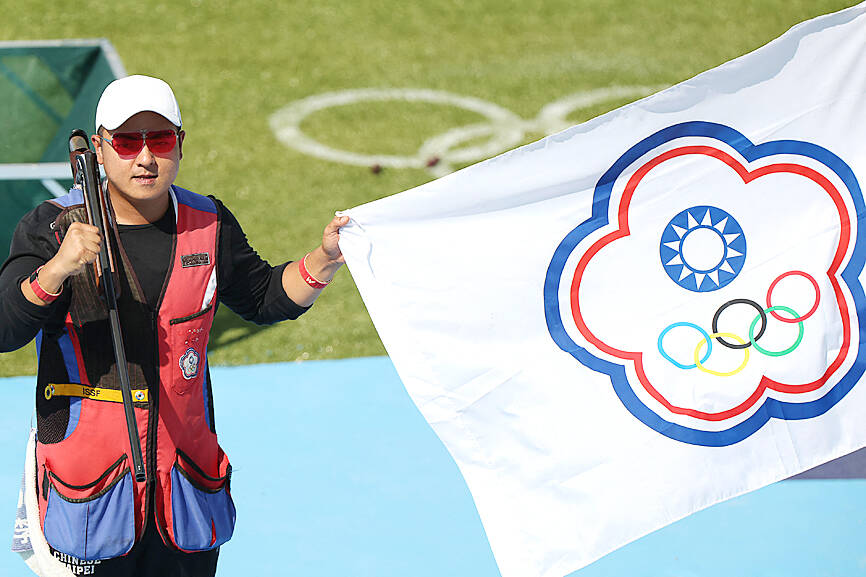
Photo: AFP
Taiwanese golfer Pan Cheng-tsung (潘政琮) tied for seventh overall with a seven-under 206 after the third round of the men’s individual competition.
In the men’s and women’s kayak cross events, which are debuting at the Olympics this year, Wu Shao-hsuan (吳少璿) finished second in his repechage to qualify for the men’s preliminary round, while Chang Chu-han (張筑涵) also placed second to qualify for the women’s preliminary round.
Wu Shao-hsuan won bronze in the men’s kayak final at the Hangzhou Asian Games last year.
Archer Lei Chien-ying (雷千瑩) lost to South Korea’s Jeon Hun-young in the women’s individual round-of-16, concluding Taiwan’s participation in archery.
Additional reporting by AFP

CHAOS: Iranians took to the streets playing celebratory music after reports of Khamenei’s death on Saturday, while mourners also gathered in Tehran yesterday Iranian Supreme Leader Ayatollah Ali Khamenei was killed in a major attack on Iran launched by Israel and the US, throwing the future of the Islamic republic into doubt and raising the risk of regional instability. Iranian state television and the state-run IRNA news agency announced the 86-year-old’s death early yesterday. US President Donald Trump said it gave Iranians their “greatest chance” to “take back” their country. The announcements came after a joint US and Israeli aerial bombardment that targeted Iranian military and governmental sites. Trump said the “heavy and pinpoint bombing” would continue through the week or as long

TRUST: The KMT said it respected the US’ timing and considerations, and hoped it would continue to honor its commitments to helping Taiwan bolster its defenses and deterrence US President Donald Trump is delaying a multibillion-dollar arms sale to Taiwan to ensure his visit to Beijing is successful, a New York Times report said. The weapons sales package has stalled in the US Department of State, the report said, citing US officials it did not identify. The White House has told agencies not to push forward ahead of Trump’s meeting with Chinese President Xi Jinping (習近平), it said. The two last month held a phone call to discuss trade and geopolitical flashpoints ahead of the summit. Xi raised the Taiwan issue and urged the US to handle arms sales to

BIG SPENDERS: Foreign investors bought the most Taiwan equities since 2005, signaling confidence that an AI boom would continue to benefit chipmakers Taiwan Semiconductor Manufacturing Co’s (TSMC, 台積電) market capitalization swelled to US$2 trillion for the first time following a 4.25 percent rally in its American depositary receipts (ADR) overnight, putting the world’s biggest contract chipmaker sixth on the list of the world’s biggest companies by market capitalization, just behind Amazon.com Inc. The site CompaniesMarketcap.com ranked TSMC ahead of Saudi Aramco and Meta Platforms Inc. The Taiwanese company’s ADRs on Tuesday surged to US$385.75 on the New York Stock Exchange, as strong demand for artificial intelligence (AI) applications led to chip supply constraints and boost revenue growth to record-breaking levels. Each TSMC ADR represents

Pro-democracy media tycoon Jimmy Lai’s (黎智英) fraud conviction and prison sentence were yesterday overturned by a Hong Kong court, in a surprise legal decision that comes soon after Lai was jailed for 20 years on a separate national security charge. Judges Jeremy Poon (潘兆初), Anthea Pang (彭寶琴) and Derek Pang (彭偉昌) said in the judgement that they allowed the appeal from Lai, and another defendant in the case, to proceed, as a lower court judge had “erred.” “The Court of Appeal gave them leave to appeal against their conviction, allowed their appeals, quashed the convictions and set aside the sentences,” the judges